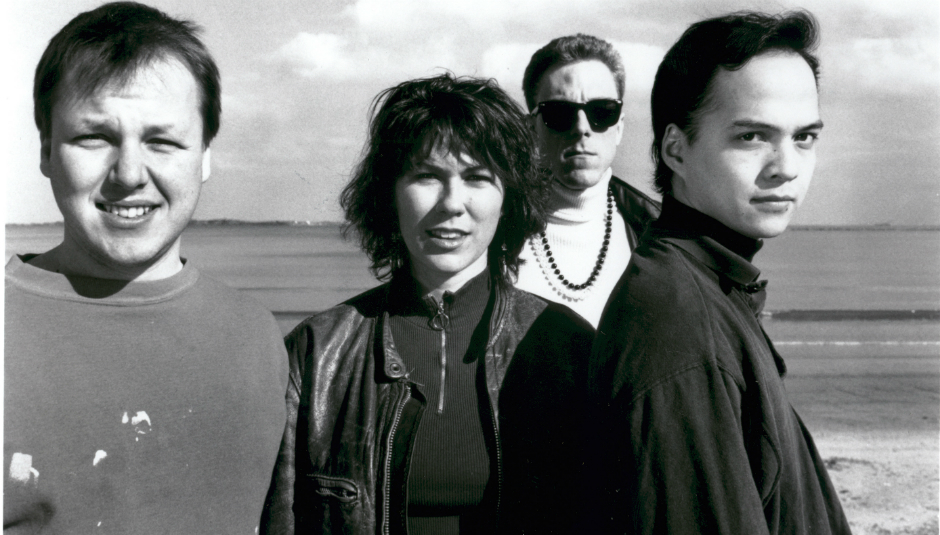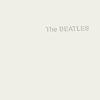30 years is a long time. Especially for an album to remain relevant and inspiring – still sounding as fresh and ‘other’ as it did on release.
When Pixies debut EP Come On Pilgrim and first album Surfer Rosa cut through the sparkling glamour of the 1980s, they unwittingly crafted a new blueprint for alternative rock – its sound, its aesthetic and its subject-matter. A sonic anomaly, it has been cited as a key work in the influencing of bands like Nirvana and Radiohead.
Combined and reissued to mark 30 years of bewildering audiences, these formative records still sound alien. The manic noise of four outsiders ripping up the rule book as if those rules never existed. Touching on punk, surf-pop, and Spanish Flamenco music and weaving biblical mythology, incest, murder and superheroes named Tony into its narrative fabric, Pixies created a dark contrast to all other rock.
“We didn’t know at all that Come on Pilgrim and Surfer Rosa had an effect on people. We didn’t know any better,” says guitarist Joey Santiago on the line from his home in the US. I speak to him after he has just dropped his kids off at school and goes about his ‘normal’ day, something that always seems strange for a guy whose guitar style flipped rock on its head and gave Pixies’ songs a frantic, ungovernable air.
Today, Santiago is in a jovial mood, engaged to talk about the past while thankful for the present that the music we are celebrating has given him and his bandmates.
Along with college friend Charles Thompson IV (Black Francis) on guitar and vocals, Kim Deal on bass, and David Lovering on drums, Santiago was part of a quartet that within just a few short years of forming had released a stunning EP, toured the US and Europe, and released a ground-breaking debut album.
The astonishing thing is just how quickly the band became fully formed, ‘classic’ even, as Santiago explains, “Yeah, musically we pretty much gelled right away, we accidentally came upon a style and personality-wise, we made do with it. I mean we got along – we had lunches, dinners, get-togethers and tried to do ‘bandy’ things other than music.”
This is documented by the inclusion on the reissue of Live From The Fallout Shelter, a radio session first aired in late 1986 on Massachusetts station WJUL-FM. Although not the best quality recording, it’s an artefact of the embryonic Pixies, who at this time already had several of their classics fully formed. Despite being performed with noisy abandon they are the songs we know and love. Take the droning version of ‘Caribou’, or the frantic version ‘Holiday Song’; the band lark about, crack jokes, and are clearly not taking anything too seriously.
“We knew it was good. The songs were great, and it captured it. And the recording as well, it doesn’t have to be a knock-out recording for me to enjoy an album. The songs just have to be cool and weird,” explains Santiago of the session.
How did the band, so soon after forming, have a set full of solid, game-changing classics? Santiago continues, “Well, they’re short songs for starters. I don’t even know how long that set was. Whatever club we were going to play in, you gotta do 35 minutes, but 35 minutes for us is, I dunno, thirteen or fifteen songs, maybe even seventeen. It was out of necessity that we had to have a bunch of those songs. There’s a bit of math involved, aside from music. We’ve gotta fill up the time you know. Two minutes times X needs to equal 35 minutes. That’s the way we looked at it.”
Such a mathematical approach may seem surprising to fans of the band, especially the first recordings, as it’s the unhinged, near-to-breaking intensity that makes it shine. How ‘great’ these songs were quickly became apparent, with UK label 4AD taking select cuts from the first recordings at Fort Apache, sent over by the band looking for a deal, and releasing them as they were as Come On Pilgrim. No re-recordings, no edits – the label saw something unique in these stark, dark and vital songs.
A key component of this standout ‘otherness’ was Black Francis’ vocal delivery – flitting between angelic wonder and pained, feral yelps (a sound of inner turmoil looking to kill any sense of beauty). Santiago admits it was nothing like he had ever heard (and probably never has since), recalling a moment at Fort Apache where this bizarreness really manifested itself.
“I remember at Fort Apache when we were recording the EP – we didn’t know it was going to be an EP incidentally, we were just recording a bunch of songs – I was exiting the studio and I got stuck between the exit of the door of the studio into another door that I didn’t want to creak because Charles was singing, you know. I was there and there was no background music and I could just hear him screaming without any context of music. It was bizarre to say the least,” he says.
“Imagine that, someone in headphones singing those songs without the music. That’s fucking crazy. Even as ferocious as it sounds, I was half laughing. It’s humorous, it’s bizarre. For me when something is that bizarre it makes me laugh. It certainly had that effect on me, so that’s good.”
On paper, this all sounds incredibly serious and cloaked in darkness, but for many, there is an inherent humour in these creations. Bearing in mind the often-twisted subject matter, I ask Santiago if there is any humour intended?
“I would say so. I think it’s funny. I think the guitars on it are hilarious. They are just plain old stupidity to me. Not ‘stupid’ as such, but in a good sense. There’s an abandon on it and it sounds funny. I think a lot of music for me, and for us, does have to have that element to it,” he answers.
“We gotta find some humour in all the songs we like out there. I don’t want to be serious, I’m already serious in real life. I’m trying to take a break when I am listening to music. There’s no humour intended in the beginning before you play the first note, but if you find it, kudos. That’s how natural it was, taking a break from life when we were recording.”
What Come On Pilgrim represents is a young band, ‘living in shitty apartments’, doing their own thing. Making it was a pipe-dream and in that sense, the pressure was on, but the expectation was low. “We had nothing to lose and everything to gain. We wanted to do this, I suppose you could always back into something else?”
In contrast to the EP, with a label fully in support and a real buzz in Europe growing, their full debut Surfer Rosa is the sound of a band discovering the value of their music, solidifying the potential and working with a producer known for getting the best of a band’s raw energy, Steve Albini.
Much has been said about Albini’s often ‘difficult’ working mannerisms, with the often-recited tales of him showing horrific images to the band to put them on edge, but mythology aside, what did Albini tangibly bring to the finished album?
Santiago explains, “Sonics. He captured the vibe of the band at that time, definitely. We had the songs, arranged. He basically just had to hit record and get the best sound as possible. And he knew that. I mean I can’t go in his head, but having a band that was prepared like that, he probably just thought: ‘Oh well, I might as well just do my job and get the best sound as possible. I don’t want to be the weak link here.’”
Today, nostalgia and hindsight consider this album to be one of the greatest debuts of all time, a game-changer. But in the 80s, Pixies were not your ‘normal’ band package, I ask how they were received in the early days when taking these tunes on the road?
“It depends, some cities were like wow and others, small little towns, or not even that, some cities would look at us and think: ‘What the fuck it this?’ We’d be like: ‘Other cities have liked this, you’re going to like it. Trust us. Right now, you’re just shell-shocked,’” laughs Santiago.
This shell-shock has definitely subsided, with an anniversary tour of the EP and album respectively called Come On Pilgrim…It’s Surfer Rosa selling out across the world, including five nights at London’s legendary Roundhouse for sold-out shows.
After their initial demise in the early 90s, the cult of Pixies grew – a soundtrack appearance in the 1999 movie Fight Club cementing a growing fascination with an audience that missed out on the band the first time. Their intended short-run of comeback gigs in 2004 were so well received that the band have barely stopped for over a decade and have since released new music (although none of it as well received as their hey-day classics.)
Pixies are clearly now a ‘stadium band’, so why chose a run of smaller gigs instead of packing out one ‘enormo-dome’ – less work, for the same pay?
“Because we like hotel rooms. We love the fact, like, ‘Oh wow, one city wants us for that long. Let’s just do it. And one big show. How many does the Roundhouse hold? We know our fanbase too, I wouldn’t want to go to an arena and deal with the parking and all that shit. It’s more convenient, it’s more of an event, it’s more intimate – well not as intimate as the tiny clubs we used to play – but, for me as a music fan, I’d rather see a band in that kind of place.”
Contemplating the sheer amount of love for these first recordings that still exists, Santiago again lays down his feelings about them and his lack of awareness at the time (even now) about how important they are.
“We were in Europe within a year of us forming, definitely within a year and half, so we thought: ‘Hey, this is what bands do, right?’ Just looking at it from a perspective of our age, we really didn’t know how long bands took to make it. But when you do something right and you do end up touring the world, we thought that was normal. But on Doolittle [second album, considered a solid indie classic], we were like: ‘We’ve got a producer who did Echo and the Bunnymen’ and all this stuff. ‘We’re in a real studio now, we have an engineer, what the fuck’s an engineer? Pre-production? Holy shit, why are people so serious now?’”
“We were listening to the mixes when we were doing Doolittle and that was the moment when it was like: ‘Ah, I see why all these people are fucking involved, this is the shit.’ That’s when I noticed that we were going to be a stepping-stone. This shit’s unique.”
But speaking about the anniversary itself, he is a little less animated. “It feels good. I would love to have the people’s excitement about it but honestly, it’s just another year for me.”
Obviously, 30 years on Pixies are different people – older, and with families and responsibilities. In many ways, suggests Santiago, the band are more comfortable and confident in being a band than ever, and they certainly work together better.
“Yeah, definitely. We’re not so petulant. I dunno why, we didn’t have any kids or things to worry about. We were living in shitty apartments, there’s no reason not to go on the road. But that’s how much of an attitude young people have.”
He continues to speak about his own children’s response to their famous dad. “They went on tour with us. Right now, they like the fact that people like it! In fact, last night I was buying a computer for my son, just for Fortnite, and we were building this computer. He wanted to build it himself. Then on the checkout, this fan came to me and my son was like: ‘Wow this is kinda cool’. Then I picked up my daughter from babysitting last night and my son goes: ‘Hey there was this guy that recognised dad. His name was Jeremy.’ I was like: ‘No, his name was Jason.’ He goes: ‘That’s cool, dad, that you remember his name.’ It was on his fucking name-tag! So, they are getting it. That other people like it. That much they get.”
There’s a chance that a real revelation is to come, a moment when they realise that the music their father made has, since the late 80s, been cited by countless incredible bands as a touchstone for their own creations. How does Santiago feel about this on-going influence he has had?
“That’s great. It keeps everything alive. Being in the middle of it all, I feel great. Did the Beatles and the Rolling Stones feel special about it? Yeah, I’m sure they do, but if you ask them the same question they’ll probably say: ‘Yeah it’s nice.’ We probably have the same attitude. It feels great but my favourite band is probably in the garage right now,” he states enthusiastically.
“They are probably listening to the Pixies, the Velvet Underground, the Beatles, all the same shit we listened to, but it’s going to be great and I can’t wait to hear how they interpret it.”
And that’s a perfect full-stop to our conversation about these records. In re-interpreting rock music Pixies created a new aural language that has empowered new bands, over and over, to find their own way of doing things. It’s likely that we’ll still be talking about Come On Pilgrim and Surfer Rosa in the same terms in another thirty years – and that really is something to celebrate.
Come on Pilgrim...It's Surfer Rosa is out now on 4AD in triple CD, triple LP, and deluxe triple LP. For more information about the release, please click here. For information about the band, including forthcoming tour dates, please visit their official website.
Photo Credit: Millicent Harvey






















